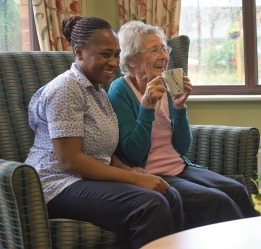- A
- A
- A
Every little sip helps!

By George Sampson, MHA Hospitality Manager
Have a drink, they say. Oh, yes please, say I. But no, not an alcoholic one but water, juice, tea, coffee, anything that keeps me and you hydrated.
Staying properly hydrated and making sure you have the right food is important for all, but especially for older people. That is why at MHA we value our chefs and kitchen staff for how they provide appetising meals for our residents and support our care staff.
Dehydration is serious for an older person. It can lead to sore and dry skin, increasing the risk of pressure ulcers, an increased risk of kidney stones, dizziness resulting increased risk of falls and incre4ased risks of clots and heart attacks.
So how at MHA do we make sure our residents and members are drinking enough and eating healthy?
In all our care homes you’ll find ‘hydration stations’. This is where residents, relatives and staff members can help themselves to a refreshing drink of water.
Kitchen staff will make sure freezers are stocked with ice lollies in summer to not only help residents keep cool but also to make sure they are kept hydrated in hot weather.
Older people often have a reduced appetite, which can lead to the hydration they receive through their food intake to be reduced. So it is important that we not only make sure they are eating a balanced diet to meet their needs but also to make sure they continue to drink enough.
Every little sip helps is what we say at MHA, which is why we took the learnings from a study we did with Anglia Water very seriously. Homes which had water coolers installed found they had a 50% reduction in falls and a decrease in GP call outs and urinary infections. And fears by residents that drinking more would mean more toilet visits – one of the main barriers to drinking more – were unfounded as once the bladder had adjusted to more volume, toilet visits stayed the same.
A current trial with Unilever on hydration stations in MHA homes has found that:
- relatives like having the station as it enhances their visits by giving them opportunities to meet and share experiences with other relatives and to feel part of the team at the home
- staff have found residents help others with drinks and prompt care staff that they need a drink
- homes love fruit teas and they have prompted some interesting discussions around flavours
- staff have been positive about the hydration stations and are starting to turn making a cup of tea for residents in to a social activity.
We have found that not only having water and other drinks available at all times, offering drinks rather than asking if someone wants one and promoting residents to take a sip but not nag them really does work.
Bottoms up!
